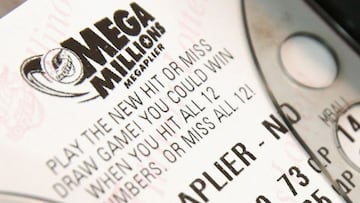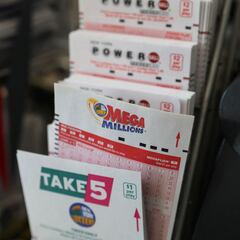What are the biggest ever Mega Millions jackpots?
As the Mega Millions jackpot climbs to a record estimated total of $1.55 billion, we took a look back at the largest top prizes in the lottery’s history.

After there were no jackpot winners in Friday’s Mega Millions draw, the top prize has now rolled over to an estimated $1.55 billion - the largest in the lottery’s 27-year history.
Fifth Mega Millions jackpot over $1bn
As things stand, the biggest ever Mega Millions win is $1.53 billion - a jackpot scooped by a single player in South Carolina in October 2018. According to Mega Millions organisers, it made history as the world’s largest ever lottery prize won by one individual.
It was the first time since Mega Millions was established in 1996 that the jackpot had crossed the $1 billion mark. In all, the prize has now reached 10 figures on five occasions.
Until now, the closest a Mega Millions jackpot had come to surpassing 2018′s $1.53 billion was earlier this year, when the winning figure climbed to $1.35 billion before a single ticket purchased in Maine scooped the grand prize in mid-January.
With no big jackpot winner in tonight’s (August 4) draw #MegaMillions has climbed to an all-time high of $1.55 Billion making it the biggest Mega Millions jackpot ever. California may have not been the big winner, but we continue to celebrate all wins big and small. Tonight’s… pic.twitter.com/FQQEJD9NTy
— California Lottery (@calottery) August 5, 2023
Five largest ever Mega Millions jackpots
| Jackpot | Date won | Location | Number of winners |
|---|---|---|---|
| $1.55 billion (estimated) | Ongoing | ||
| $1.53 billion | 23 October 2018 | South Carolina | 1 |
| $1.35 billion | 13 January 2023 | Maine | 1 |
| $1.34 billion | 29 July 2022 | Illinois | 1 |
| $1.05 billion | 22 January 2021 | Michigan | 1 |
How are Mega Millions payments distributed?
Winners have two options.
The first is to receive an annual payment over the course of 30 years.
The second is to receive a lump-sum payment shortly after winning. However, depending on which option one selects, the total disbursed will be impacted. Those who choose the 30-year option will be distributed a larger total, but the investment potential of the lump-sum option could lead a much larger total over the course of the following decade.
Related stories
However, the final payout distributed to individuals has a lot to do with state taxes and rules in their state. For instance, according to liveabout.com, in Idaho, a lottery winner can expect to take home 78.53 percent of the advertised winnings, while in West Virginia the total is much lower, at 16.97 percent.
Many states tax lotteries at very high rates and use the money to fund public programs, like schools, infrastructure projects, and other social benefits that a large percentage of residents are able to take advantage of. The median amount distributed across states is a little under two-thirds, at 64 percent.

